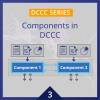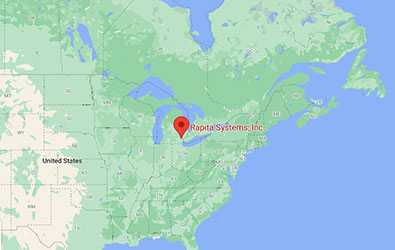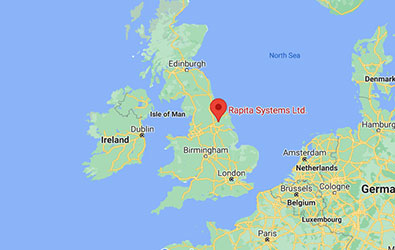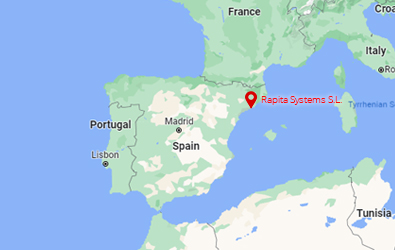In a partnership driven by the ASC research project, Campgemini Engineering were given special access to RapiTime and the RTBx data logger. World leaders in engineering and R&D Services, Campgemini Engineering utilized Rapita’s expertise as an embedded specialist to help de-risk future embedded systems projects. Campgemini Engineering's (Previously "Altran") aim was to perform timing analysis of software as part of the continuous integration (CI) cycle. They would be generating minimum, maximum, average and worst-case estimate timings on the Texas Instruments TMS570ls3137 safety board (as a typical on-board system).
Project: The Braking Prototype
The braking prototype is a skeletal example of an automated train braking system: given braking parameters, speed and target distance, it calculates braking points, braking intervals and takes action if necessary, such as raising alarms and applying the emergency brake.
Integrating with Jenkins
This example represents a non-trivial application in terms of performance and timing, where the entire development is captured using CI tools and timing analysis. Using RapiTime, all execution and timing can take place on-target, with reports automatically generated. RVS can be integrated with Jenkins (an open source automation server) to generate a dashboard display of performance at each stage of the development, as illustrated above.
RapiTime and the RTBx
As well as forming part of their strategy for a specific research project, Campgemini Engineering also wanted to assess RapiTime and the RTBx as a solution to deploy across future turn-key projects. As part of the research project, Campgemini Engineering were provided with a free trial RapiTime license and a loan of an RTBx data logger. The RTBx is designed to collect and timestamp long streams of verification data from software tests run on embedded hardware. It is target-independent, supporting a wide variety of target architectures, and provides an excellent way of collecting trace data for use by RVS.
The Hardware:
- Rapita RTBx: a cost-effective, easy-to-use solution for collecting long streams of verification data from tests run on embedded targets.
- TMS570LS3137 board: a Texas Instruments processor board marketed for safety systems.
- A secondary microcontroller chaperone board: in this case an Arduino Leonardo.
- Master server: holds the Git repository, performs the building, controls the target board, and processes, stores and hosts results.
- User development PC.
Hardware setup
The RTBx is connected to the server via Ethernet (it could be connected remotely). TMS570 is connected to the server via USB, requires Rapita Verification Suite (RVS) to build, instrument and communicate. TI software to flash the board and the chaperone microcontroller controls a pin on the TMS570 via wire. TMS570 board is connected to the RTBx by a wiring harness and proprietary breakout box.
What Campgemini Engineering had to say
“As a world leader in engineering and R&D services, Campgemini Engineering is always looking to partner with innovative solution-providers to deliver the best services we can to our customers. Partnering with an embedded systems expert like Rapita for this project is an excellent complement to our company profile. Their tools support on-target timing analysis and can be integrated into the continuous integration model we are using, as successfully demonstrated by this project.” - Stuart Mathews, R&T Manager - Campgemini Engineering
Who are Campgemini Engineering?
Campgemini Engineering is the undisputed world leader in engineering and R&D services. The Group offers its customers a unique value proposition to meet their transformation and innovation challenges. Campgemini Engineering supports its customers, from concept to industrialization, to develop the products and services of tomorrow. Campgemini Engineering has been working for more than 35 years with major players in many sectors: automotive, aeronautics, space, defence & naval, rail, infrastructure & transport, industry & consumer products, life sciences, communications, semiconductor & electronics, software & internet, finance & public sector. The acquisition of Aricent expands the Group's portfolio of expertise in semiconductors, digital experience and design innovation. Campgemini Engineering generated €2.9 billion in revenue in 2018, with nearly 47,000 employees in more than 30 countries.
More on the ASC Project
ASC is an R&D project led by Rapita Systems which aims to increase the amount of software that can be executed in safety-critical embedded systems such as jet engines to support increased functionality, reduce project costs, and delay expensive hardware upgrades; this work is funded by NATEP. Other partners in the project include Campgemini Engineering, BAE Systems, BSC, GE and Rolls Royce.
Find out more at: ASC: Airborne Software Capacity
Leaders in aerospace research projects
Rapita Systems have a long history of participating in cutting-edge research projects, developing technology that helps to lower certification costs in the safety-critical domain. These projects have enabled us to accelerate the development of our best-in-class toolsuite, including RapiTime, our timing analysis solution.
Contact us to discuss your timing analysis needs.

 Rapita Systems launches MACH178 Foundations for multicore DO-178C compliance
Rapita Systems launches MACH178 Foundations for multicore DO-178C compliance
 Collins Aerospace and Rapita present award winning paper at DASC 2024
Collins Aerospace and Rapita present award winning paper at DASC 2024
 Embedded Office GmbH & Co. KG and Rapita Systems announce strategic partnership
Embedded Office GmbH & Co. KG and Rapita Systems announce strategic partnership
 Control Coupling Basics in DO-178C
Control Coupling Basics in DO-178C
 Components in Data Coupling and Control Coupling
Components in Data Coupling and Control Coupling
 The ‘A’ Team comes to the rescue of code coverage analysis
The ‘A’ Team comes to the rescue of code coverage analysis
 Why there’s no standard approach for Data Coupling and Control Coupling Analysis
Why there’s no standard approach for Data Coupling and Control Coupling Analysis
 DO-278A Guidance: Introduction to RTCA DO-278 approval
DO-278A Guidance: Introduction to RTCA DO-278 approval
 ISO 26262
ISO 26262
 Data Coupling & Control Coupling
Data Coupling & Control Coupling
 Verifying additional code for DO-178C
Verifying additional code for DO-178C
 DO-178C Multicore In-person Training (Munich)
DO-178C Multicore In-person Training (Munich)
 DO-178C Multicore In-person Training (Fort Worth, TX)
DO-178C Multicore In-person Training (Fort Worth, TX)
 DO-178C Multicore In-person Training (Toulouse)
DO-178C Multicore In-person Training (Toulouse)


















